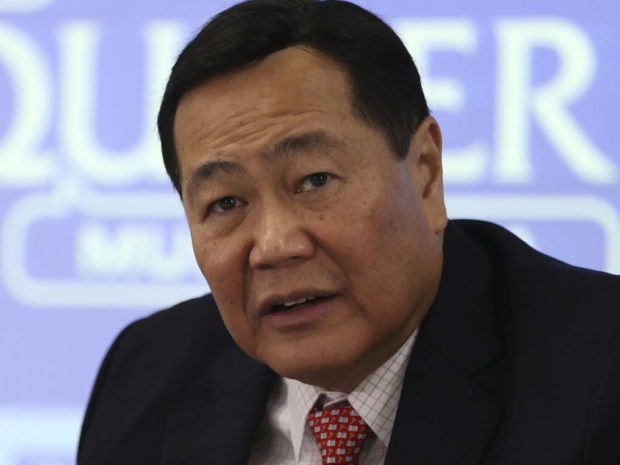Carpio: PH has regained ‘momentum’ in sea row

Former Senior Associate Justice Antonio Carpio. INQUIRER file photo
The Philippines has “regained the momentum” after it “slept” for six years during the Duterte administration on the 2016 landmark arbitral award that invalidated China’s expansive claims in the South China Sea, according to former Supreme Court Senior Associate Justice Antonio Carpio. “We have definitely lost ground during the Duterte administration. Those are six years the government slept on the arbitral award,” he said in a forum hosted by Stratbase ADR Institute marking the 7th anniversary of the ruling on Wednesday.
The decision by the arbitral tribunal in 2016 invalidated Beijing’s claim to almost the entire South China Sea. It reaffirmed the country’s sovereign rights over its 370-kilometer exclusive economic zone (EEZ), including the West Philippine Sea.
Then President Rodrigo Duterte set aside the ruling in hopes of economic aid and investments from Beijing, which largely failed to materialize.
His successor, President Marcos, had expressed stronger support for the arbitral award and sought more robust security ties with the Philippines’ treaty ally, the United States, and other countries, particularly Japan and Australia amid China’s aggressive actions in the West Philippine Sea.
“We’re getting the support of the G7 (Group of Seven), India, and other countries will follow. I think we’re getting the support now because we’re showing we’re asserting our sovereign rights,” Carpio said.
During a summit in May, the G7 countries—US, UK, Canada, France, Germany, Italy and Japan—reiterated their position that the award was legally binding. Last month, India, which has been neutral for seven years, took the side of the Philippines and called on Beijing to adhere to the ruling.
“I think we are getting the support now because we are showing that we are asserting our sovereign rights. If we don’t assert our sovereign rights, other countries won’t assert for us,” Carpio said.
‘Lost time’
Ambassadors from several countries supporting the 2016 award—the US, Australia, Japan, the European Union, France, UK and India—participated in the forum to show support for the ruling.
Maritime law expert Jay Batongbacal said in the same forum that the Philippines lost opportunities during those six years under Duterte, which could have “slowed down” Chinese activities—such as harassment, reclamation and militarization—in the South China Sea.
“We lost time—six years. … Definitely, we’ve lost a lot. But suddenly, it’s like a gate has been opened and all these countries are now very strongly supporting our position because finally, we are speaking out,” he said.
The Filipinos, especially the Philippine Coast Guard and Navy, are “acting and showing that they are trying to protect our people out at sea,” said Batongbacal, director of the Institute for Maritime Affairs and Law of the Sea of the University of the Philippines College of Law.
“This should have happened in 2016. If we had started then, who knows where we would be right now,” he said. “Hopefully, this will be sustained.”
On the day the Philippines marked the anniversary of the arbitral ruling, China said it still rejected the award and accused Washington of “masterminding” the arbitration.
Beijing will not bend to the “pressure” from “troublemaker” countries to accept the “illegal” award, the Chinese Embassy in Manila said in a statement.
“As the mastermind behind the South China Sea arbitration, the US ropes in allies to play up the issue each year on the anniversary of the illegal award to gang up against China and to exert pressure, and force China into accepting the award. We are firmly against this,” it said.
The US Embassy did not directly respond to China’s allegations, but Ambassador Marykay Carlson reaffirmed her country’s support for the arbitral tribunal’s decision during Wednesday’s forum.
“The United States believes that all countries, large and small, should play by the same rules, and that large countries should not be allowed to bully smaller ones,” Carlson said.
Still, the Chinese Embassy insisted that the ruling was “illegal, null, and void” and “gravely violated” the United Nations Convention on the Law of the Sea.
When asked by the Inquirer to specify the provisions that violated China’s interests and evidence to back its accusations against the US, the Chinese Embassy did not respond as of press time.
Carpio said that it’s high time for the President to stop applying the foreign policy of “friend to all and enemy to none” on China.
“That won’t work if you have an actual enemy seizing your maritime right,” Carpio pointed out.
He said that the best next step for the Marcos administration was to bring the arbitral award to the United Nations General Assembly, acting as the “voice of the people of the world,” to vote on a resolution to call out China’s noncompliance and aggressive actions in the strategic waterway.